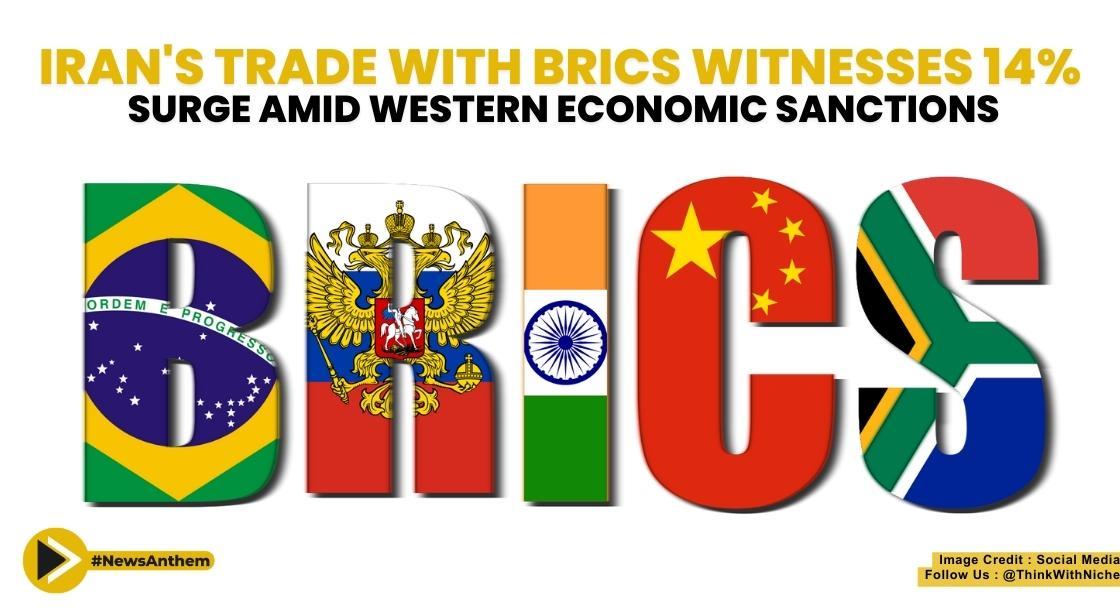Iran's Trade With BRICS Witnesses 14% Surge Amid Western Economic Sanctions

News Synopsis
Iran Sees Robust Trade Growth with BRICS Amidst Western Sanctions
Iran's Foreign Minister, Hossein Amir-Abdollahian, addressed the 'Friends of BRICS' gathering during the Foreign Minister's Meeting in Cape Town, South Africa, emphasizing the growing trade relations between Iran and the BRICS nations.
Despite facing economic sanctions from the West, Iran's trade with BRICS members has witnessed a remarkable 14% surge, signaling the resilience of Iran's economic ties with these nations.
Strong Bilateral Relations and Multilateral Cooperation
During his address, Foreign Minister Amir-Abdollahian highlighted the positive state of bilateral political and economic relations between Iran and the BRICS countries. He revealed that the trade value between Iran and the BRICS nations exceeds $30 billion, demonstrating the substantial economic engagement between the parties.
The Foreign Minister also mentioned that important arrangements for multilateral cooperation have been established, paving the way for expanded relations with key BRICS countries such as Russia, China, and India within the framework of the Shanghai Cooperation Organization.
Robust Trade Figures Showcase BRICS' Importance to Iran
Customs data reflects the impressive trade volumes between Iran and BRICS members, excluding crude oil. In the fiscal year 2022-2023, trade in goods between Iran and the BRICS nations reached nearly 48 million tons, representing a significant 14% increase in value.
China, as Iran's top trading partner among the BRICS nations, witnessed a notable 37.41% increase in trade. India emerged as the second-largest trading partner, experiencing a remarkable surge of over 47%. Russia ranked third with a 3.59% increase, while Brazil witnessed a decrease in both weight and value of trade.
Notably, South Africa recorded a substantial 23% increase in bilateral trade, solidifying its position as Iran's primary trading partner on the African continent.
BRICS Focuses on Local Currency Usage in Global Trade
As Iran seeks to mitigate the impact of Western sanctions, it has been actively fostering closer ties with Russia. In 2022, the trade in goods and services between the two nations amounted to $4.6 billion. Furthermore, both Moscow and Tehran are actively pursuing the de-dollarization of their economies and have agreed to increase the usage of their respective national currencies in bilateral trade.
BRICS Expands Membership Amid Global Interest
With Brazil, Russia, India, China, and South Africa as its current members, BRICS is considering enlarging its membership to include more nations that have shown interest. Originally formed as BRIC in 2001, South Africa joined the bloc in 2010. Representing a significant portion of the world population (41%) and a substantial share of global GDP (24%), BRICS holds over 16% of the world trade, according to World Bank data.
Overall, Iran's growing trade relations with BRICS nations despite Western economic sanctions demonstrate the importance of alternative partnerships and the resilience of Iran's economy.
The increasing collaboration between Iran and key BRICS countries, along with the bloc's emphasis on local currency usage and potential expansion, highlights the evolving dynamics of global trade and economic cooperation.
Conclusion
Iran's trade with BRICS nations has experienced a notable 14% surge, defying the challenges posed by Western economic sanctions. The robust bilateral relations and multilateral cooperation between Iran and BRICS countries, as highlighted by Foreign Minister Hossein Amir-Abdollahian, underscore the significance of these partnerships in promoting economic growth and resilience.
China remains Iran's top trading partner within the BRICS bloc, followed closely by India and Russia, who have witnessed substantial increases in trade volumes. Brazil, however, has seen a decline in trade figures. South Africa emerges as Iran's key trading partner in Africa, with bilateral trade experiencing a significant boost.
The emphasis on utilizing local currencies in global trade by BRICS nations, including Iran and Russia, demonstrates a shared commitment to reduce reliance on the US dollar and foster stronger economic ties. This move enhances the economic sovereignty and stability of these nations amidst the challenges posed by Western sanctions.
BRICS, comprising Brazil, Russia, India, China, and South Africa, continues to evolve and expand its membership as more countries express interest in joining. With a significant share of the world population, GDP, and global trade, BRICS plays a crucial role in shaping the dynamics of international trade and economic cooperation.
Iran's growing trade ties with BRICS nations and its desire to become a member of the economic bloc reflect its commitment to exploring alternative avenues for economic growth and development. Despite the obstacles presented by Western sanctions, Iran's engagement with BRICS exemplifies its resilience and determination to forge ahead in the global economic landscape.
You May Like









